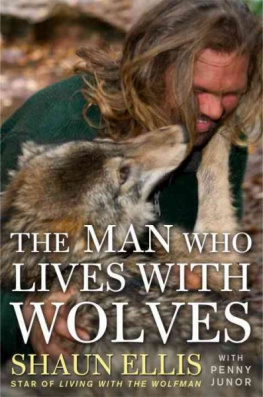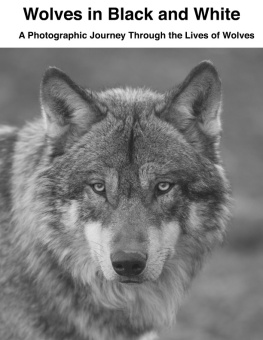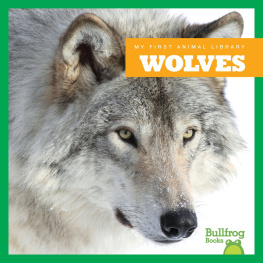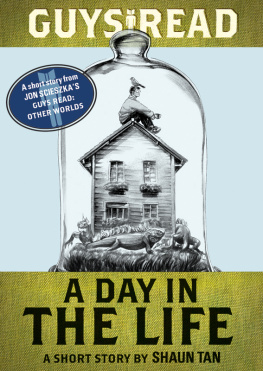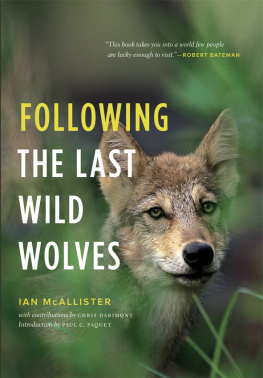Shaun Ellis - The Man Who Lives with Wolves
Here you can read online Shaun Ellis - The Man Who Lives with Wolves full text of the book (entire story) in english for free. Download pdf and epub, get meaning, cover and reviews about this ebook. year: 2009, publisher: Crown, genre: Detective and thriller. Description of the work, (preface) as well as reviews are available. Best literature library LitArk.com created for fans of good reading and offers a wide selection of genres:
Romance novel
Science fiction
Adventure
Detective
Science
History
Home and family
Prose
Art
Politics
Computer
Non-fiction
Religion
Business
Children
Humor
Choose a favorite category and find really read worthwhile books. Enjoy immersion in the world of imagination, feel the emotions of the characters or learn something new for yourself, make an fascinating discovery.
- Book:The Man Who Lives with Wolves
- Author:
- Publisher:Crown
- Genre:
- Year:2009
- Rating:5 / 5
- Favourites:Add to favourites
- Your mark:
- 100
- 1
- 2
- 3
- 4
- 5
The Man Who Lives with Wolves: summary, description and annotation
We offer to read an annotation, description, summary or preface (depends on what the author of the book "The Man Who Lives with Wolves" wrote himself). If you haven't found the necessary information about the book — write in the comments, we will try to find it.
The Man Who Lives with Wolves — read online for free the complete book (whole text) full work
Below is the text of the book, divided by pages. System saving the place of the last page read, allows you to conveniently read the book "The Man Who Lives with Wolves" online for free, without having to search again every time where you left off. Put a bookmark, and you can go to the page where you finished reading at any time.
Font size:
Interval:
Bookmark:


The Man Who Lives with Wolves


I would like to dedicate this book to the memory of my grandfather, Gordon Ellis. Thank you, Old Man, for your patient teaching; your wisdom and knowledge is with me wherever I go. I was once told by my brother Levis people, the Nez Perc, that someone only dies if you forget them. You will be in my thoughts forever.
Chapter One
Chapter Two
Chapter Three
Chapter Four
Chapter Five
Chapter Six
Chapter Seven
Chapter Eight
Chapter Nine
Chapter Ten
Chapter Eleven
Chapter Twelve
Chapter Thirteen
Chapter Fourteen
Chapter Fifteen
Chapter Sixteen
Chapter Seventeen
Chapter Eighteen
Chapter Nineteen
Chapter Twenty
Chapter Twenty-one
Chapter Twenty-two
Chapter Twenty-three
Chapter Twenty-four
Chapter Twenty-five
Chapter Twenty-six
Chapter Twenty-seven
Chapter Twenty-eight
Chapter Twenty-nine
Chapter Thirty
Chapter Thirty-one
Chapter Thirty-two
Chapter Thirty-three
W hen you are living with wolves, all that matters is staying alive and protecting the pack; days slip into weeks, weeks into years. Time, as we know it, has no relevance and I want to apologize in advance if I am a little fuzzy about dates and times. I have never kept a diary, never been a letter writer, and have never hung on to anything. For much of my life I have lived out of a rucksack so have very few possessions of any sort. There is very little, therefore, to remind me about when the various events that took place in my life actually happened. If I have attributed something to the wrong year, please bear with me. The events themselves I remember as if they were yesterday.

Matsi. Roger Cooke
Touching a Nerve
I was helping out at a wildlife center in Hertfordshire, one of the home counties, just north of London. A man appeared outside the wolf enclosure one day, pushing a child in an old-fashioned wheelchair that looked almost Victorian, with a large rectangular tray on the front of it. I was immediately struck by how out of place it looked. He told me that he and his son, who may have been thirteen or fourteen and who, I could see at a glance, was severely disabled, had driven all the way from Scotland, a distance of around five hundred miles. He had heard that we allowed members of the public to interact with the wolves and he wanted his son to meet one.
I was surprised that this man had gone to such lengths to show his son a wolf. The child didnt look as though he would get anything out of the encounter. He sat immobile, silent, staring into space, and I doubted that he would even be able to stroke the animals fur. Normally, I loved this part of the job. Children arrived with such preconceptions. They pulled back and screamed when the wolf came near, convinced by all the stories theyd read and the cartoons theyd watched, that wolves were sly, vicious creatures that ate grand mothers, blew down the houses of little pigs, and ripped the throats out of little girls. I had grown up with exactly the same terror. It had taken me many years to discover that wolves are actually shy, intelligent animals with a very sophisticated social structure, whose bloodthirsty reputation is not deserved. I found nothing more gratifying than watching children touch the wolves and listen to what I had to tell them about these animals, and watch their prejudice and ignorance fade away.
I felt almost evangelical about this. I thought that if children could feel their coats and look them in the eye, they could make up their own minds about them so that in time, future generations will perhaps be ready to give back to wolves the place in our world that is rightfully theirs.
Once upon a time wolves and men lived alongside one another, each respecting and benefiting from the others way of life. Sadly, those days are gone and I believe that we are the poorer for that. The natural balance in nature that they promoted has been whittled away and several species, including our own, have been allowed to go unchecked and become diseasedin the truest sense of the word.
This may be a little fanciful but I believe that as well as healing the natural world and restoring its balance, human society could benefit from having wolves roaming the forests once more. We could learn a lot from the loyalty they display to family members, the way they educate and discipline their young, the way they look after their own, and the circumstances in which they use their considerable weaponry to kill. The world is not yet ready for that but I like to think that in some small way my work of the last twenty years might have begun the process.
Whenever I introduced a child to the wolves, it was vital that the child did not become frightened. I had to watch their reaction carefully so that I didnt do more harm with this exercise than good.
This boy didnt speak. His disabilities were clearly mental as well as physical and I guessed he might have been autistic. I could immediately see there would be a problem and asked the father, as tactfully as I could, whether the child would be able to indicate when he no longer wanted to be near the wolf, explaining how important this was. He wont be able to, said the man, bluntly. He has never spoken, and never reacted in any way to anything. And he has never expressed an emotion in his life.
Common sense was screaming at me to tell this man to turn around, to take his poor child all the way back to Scotland, but for reasons I cant explain, and a few I can, I agreed to go ahead.
There was a young wolf called Zarnesti in the enclosure that had been handled a lot in his first few months of life and was perfect, therefore, for introducing to children. His mother had stood on him or rolled on him soon after birth, crushing his jaw. As a result he had been hand reared and was not as nervous around humans as most wolves. I loved him; he had the most wonderful character, but he looked a bit like Goofy, the dog in the Mickey Mouse cartoons.
Questioning my sanity, I went into the enclosure and came out carrying Zarnesti. He was then about three months old, the size of a spaniel and a wriggling, struggling bundle of energy. It was all I could do to hold him; he was almost flying out of my arms as I put him down onto the tray on this old-fashioned wheelchair, in front of the boy. I had the pup in a viselike grip, but something miraculous happened. The moment Zarnesti saw the child he became still. He looked into the boys eyes and they stared at each other. Then the pup settled down with his back legs tucked under him and his front legs stretched out in front. I took one hand off him and I realized very quickly that I could take the other hand away, too. After a few moments, still looking into his eyes, the cub reached forward and started to lick the boys face. I lunged to intercept him, terrified that Zarnesti would nip the boys mouth with his needle-sharp teeth, which is what cubs do to adult wolves when they want them to regurgitate food. But Zarnesti didnt nip; he just licked, very gently.
Font size:
Interval:
Bookmark:
Similar books «The Man Who Lives with Wolves»
Look at similar books to The Man Who Lives with Wolves. We have selected literature similar in name and meaning in the hope of providing readers with more options to find new, interesting, not yet read works.
Discussion, reviews of the book The Man Who Lives with Wolves and just readers' own opinions. Leave your comments, write what you think about the work, its meaning or the main characters. Specify what exactly you liked and what you didn't like, and why you think so.

